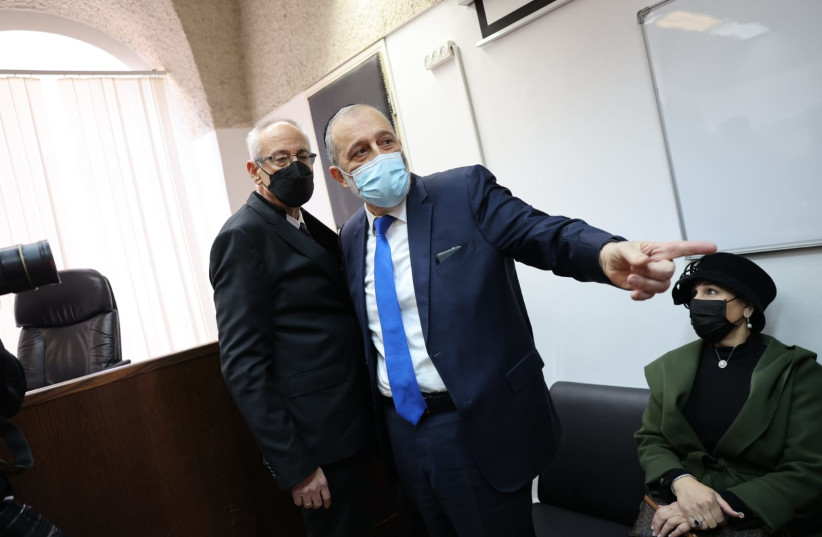Jerusalem Magistrate’s Court President Judge Shmuel Herbst on Tuesday endorsed the lenient plea deal which the state prosecution reached with Shas Party leader Arye Deri, convicted of minor tax crimes.
Deri recently resigned from the Knesset and has been fined NIS 180,000 and given a suspended sentence as part of the deal.
But critics of the deal attacked the fact that he gets to remain the head of Shas, can run for the next Knesset – and may even be able to become a minister in the future – since the issue was left open as to whether his tax crimes, dating back to 2013, carry a finding of moral turpitude.
Shas MKs asked the Knesset’s attorney-general, Sagit Afek, on Monday to allow Deri to continue to enter the Knesset plenum, because he remains the leader of Shas. They even offered to give him a paid position in the Shas faction to justify it.
Knesset Speaker Mickey Levy responded by summoning the MKs and telling them that he would not allow Deri’s conviction to be made into a joke.

Deri has also tried to keep his office in the Knesset instead of giving it to his replacement, new Shas MK Yosef Tayeb.
“We feel like cops and robbers preventing a convict from finding all possible loopholes and breaking-in points to return de facto as a member of Knesset after he himself resigned as part of a plea agreement,” a source close to Levy said.
Deri was convicted by Herbst last week. Although the court could technically order a stiffer or more lenient sentence, all signs were that the court would defer to the terms of the plea bargain as is the standard practice.
The judge explained that he felt bound to the deal by the two sides, therefore limited to the amended indictment they had presented to him while ignoring some of the potentially more serious charges which most angered critics of the deal.
Furthermore, the court noted that the NIS 180,000 fine comes on top of taxes which Deri may still be obligated to refund to the extent that he evaded them in the past.
Although Herbst noted that this was Deri’s second conviction, he defined this as a distant issue dating back to 1993. He said he was bound to respect the plea deal by High Court of Justice precedent.
THE COURT HEARING was one of the first to be televised in an incremental trend toward greater transparency since the coronavirus has sometimes impeded the media from being physically present at such key hearings.
Last week, in a somewhat anti-climactic moment, Deri stood before Herbst and confessed to the amended indictment, while answering several questions.
“I accept full responsibility... no one forced me,” he said, emphasizing that he respected the police and the prosecution through the process which lasted several years and included many lies against him which are not part of the conviction.
“I have left the Knesset and leave the mission which they granted me… I struggled with that decision a lot.”
Deri repeatedly bowed to the judge as he spoke, but knowing that he is unlikely to go to jail or be expelled from politics, he seemed completely free of stress.
Prosecutor Yaron Golomb told the court that there were several grounds for the lenient sentence, including the fact that Deri has resigned from the Knesset. This saved the prosecution and country a messy trial.
The approximately two decades between his two convictions; the absence of a pattern of tax avoidance; the small amount of funds in play; and the lack of serious, long-term criminal intent; and his limited involvement in the current lawbreaking (since his brother had a larger role), were also factors.
In addition, Deri defense lawyer Navot Tel Tzur added that her client had suffered for several years through an extensive and long corruption probe and that the High Court of Justice had effectively already approved the deal.
Groups had been attacking the deal before the High Court prior to Tuesday’s hearing before the magistrate’s court. As a result, on January 17 it rejected a petition to cancel the plea deal, telling the petitioners it was premature to decide the issue of moral turpitude and leaving open Deri’s potential path to return to the Knesset.
The court’s ruling did mean that it could still potentially block him from becoming a minister in the future, but the justices did not want to decide the issue before it was concretely on the table.
The current government technically has around four more years left to its term. In any event, there are no elections for Deri to seek a new office in the near future.
On December 29, The Movement for Quality Government in Israel petitioned Justices Yitzhak Amit, Noam Sohlberg and Alex Stein to effectively block Deri from holding future public office.
According to the NGO, Deri’s crimes in this instance and his status as a repeat offender following a prior multi-year jail sentence should lead to a finding of moral turpitude that would bar him from office for another seven years – possibly ending his career.
Deri was previously convicted in 2000 when interior minister and spent 22 months in jail. He was absent from politics for nearly 10 years, returning as Shas leader and interior minister. But in 2000 he was barely in his 40s. Now he is 62.
Gil Hoffman contributed to this report.
